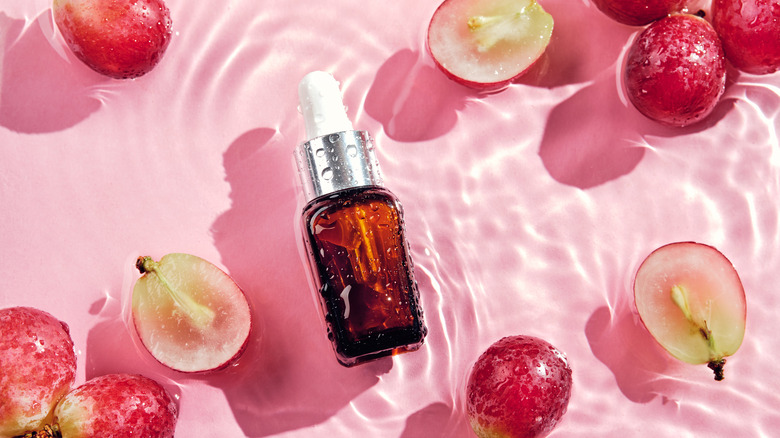Why You May Want To Add Grapeseed Oil To Your Skin Care Routine
Grapes, we're certain, are a divine gift from Goddess. Not only do they make the best frozen treat (if you haven't tried this, we recommend you do so immediately) they also add a little sweetness to autumn salads, go great in a juice box, and even better in a wine bottle. And if you thought that grape's bounty stopped there, we've got news for you.
Grapeseed oil, a byproduct of winemaking created by extracting the oil from leftover grape seeds, is proving to be a miracle product for the skin (per Medical News Today). While the leaves and fruit have a long history of medicinal use, the discovery of grapeseed oil extract is fairly new (per American Botanical Council). Records of its development can be traced back to the 1940s, and it wasn't included in commercial products until the 1970s. Since then it has been the focus of many studies, testing its competency in treating everything from hardened arteries to renal failure, male infertility, and hypertension. However, it has proven to have great success in the cosmetic industry in particular.
We believe we speak for all of us when we say that we're always ready to jump at a new product that promises glowy, clear skin. So, here are a few good reasons why you might consider adding grapeseed oil to your daily skincare regimen.
Skin benefits of grapeseed oil
Chock full of omega fatty acids and vitamin E, grapeseed oil has also been proven to have impressive anti-inflammatory, antimicrobial, and antioxidant properties — a winning combination for any skincare product (per Healthline). Many people have started using grapeseed oil to treat breakouts. While research hasn't yet confirmed the reason for its success, it can be inferred that (thanks to its antimicrobial properties) it goes deep inside pores to kill acne-causing bacteria.
A 2010 study published in Pharmacognosy Magazine also found that grapeseed oil has the ability to improve skin's moisture, softness, and elasticity, and a 2004 study published in Phytotherapy Research suggests that when taken orally on a consistent basis, grapeseed oil can even skin tone and improve the symptoms of hyperpigmentation. As if that weren't enough to send us right to the store for a bottle, a 2011 review published in Pharmacognosy Review credits grapeseed oil with protecting the skin from UV rays.
Healthline notes that unless you're allergic to grapeseed oil, it's considered safe for nearly everyone to try. You can purchase the oil and apply it directly to your skin like a serum, add a couple of drops to your favorite moisturizer, or mix it with frankincense, juniper, and lavender oils for a seriously hydrating mask. It is also available in capsules if you prefer to take it orally. In this instance, however, be prepared to wait a few weeks to see your glowing results.


